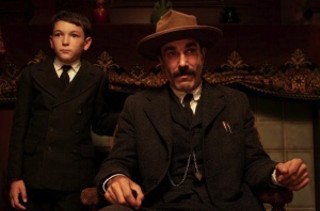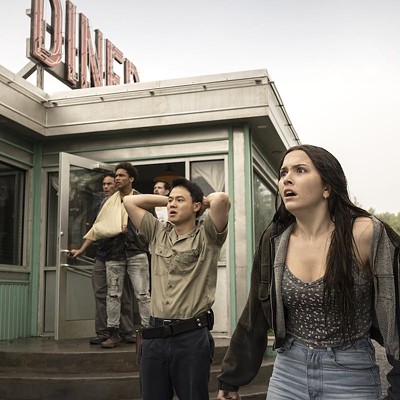A scene in Boogie Nights, Paul Thomas
Problems are not solved by peaceful means in P.T Anderson's films---the latest of which, There Will Be Blood, opens in Halifax on Friday. His characters are people living in extremes: actors in pornographic films, a lone brother among eight bullying sisters, LA residents facing life-altering crises. Boogie Nights' characters are caught up in their pursuits of fame, respect and status, in their own fringe world of triple-x filmmaking. It's a "price of fame" parable---and an off-kilter one at that, because it is set in a sub-culture most people would prefer to pretend didn't exist. In the end, the film's characters discover that all they need is each other---which is exactly as it should be.
As a filmmaker, Anderson is easily compared to Robert Altman. Both directors share an ease with large casts, an ear for realistic dialogue, and an ability to give every cast member one great scene. The two shared a set on Altman's A Prairie Home Companion when Anderson shadowed the 80-year-old Altman for insurance purposes, ready to step in and finish the film should the old man keel over during its making.
Where Robert Altman probed mundane life for extraordinary drama in sprawling, episodic films like Nashville and Short Cuts, Anderson hints at the normalcy that exists when the chaos abates: in Boogie Nights, the members of Jack Horner's repertory bid each other good night; in Punch-Drunk Love, Barry Egan's sisters call to remind him about a birthday party (though the conversations are tinged with hostility); in Magnolia, a dying man and his nurse touch on what nasty words the dying man prefers to use in everyday conversation.
Short Cuts is Altman's LA-based film about the goings-on of interconnected couples and strangers (ironically, it's LA, yet the biggest star it acknowledges is Alex Trebek). Its stories feature working people such as doctors, waitresses, local news anchors, homemakers, phone-sex workers, pool cleaners, kids'-party clowns, cops and the unemployed, and the pressures their relationships, jobs or mistakes can have on themselves and others. There is no alien lifestyle or vocation: Even the more outlandish professions of clown and phone-sex worker are born out of utility. The clown's husband is unemployed and the phone-sex worker gets to stay home with her children and work.
Magnolia is Anderson's LA-based drama about one traumatic day, again for interconnected characters. It's permeated by a "now-or-never" feeling, and its characters' stories are somewhat desperate, frantic tales. A dying man, whose cancer has rendered his mind blurry, wants to atone for abandoning his son. The dying man's production company runs the afternoon quiz show where a young prodigy is under enormous pressure from his overbearing father to attain a show-record for wins, and by proxy, redeem his failure of a father. The quiz-show's host suffers a breakdown, and so on.
The film contains a prologue of stories that could be construed as examples of incredible coincidences, but the narrator tells us "that this is not just something that happened.' This cannot be one of those things...'" Magnolia is about profoundly troubled people buffeting up against elements they can control and ones they can't.
The extremity of Anderson's premises is always wholly compelling. Never once is there a moment that feels put-on or disingenuous. It never feels as though Anderson is adding material simply to shock. His films contain quiet and tender moments for his characters but, in Paul Thomas Anderson's pictures, it is the extreme ones that are most illuminating.













